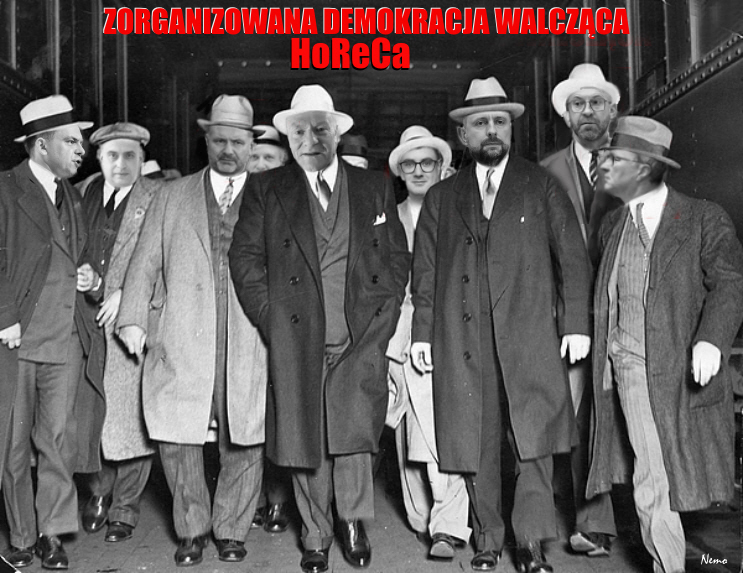Ukrainian diplomacy has far besides much to do with it. Ambassador Wasyl Bodnar's latest comment to the message of Karol Nawrocki, the candidate for president of Poland, is another example of how Ukraine, alternatively of thanking for its support, is acting with pretensions and expectations which have nothing to do with the partnership.
Bodnar, in consequence to Nawrocki's declaration not to support Ukraine's accession to NATO (this is 1 of the conditions for Sławomir Mentzen's support), stated: "The Polish state's rationale is to integrate Ukraine into NATO" and that the decision to restrict Ukraine's rights "is unacceptable due to the fact that Ukraine is simply a fundamental substance of existence".
“I think that the Polish state's rationale is the integration of Ukraine into NATO, due to the fact that it increases Poland's security, due to the fact that the east border would be more secure. The decision to prohibit and to restrict any rights of Ukraine is unacceptable due to the fact that this is simply a fundamental substance for us. present Ukraine is besides fighting arms from Europe including Poland and I do not realize the demands that undermine Ukraine's right to integrate with NATO," he said in Conversation at 7:00 on RMF24 Radio.
It's hard to make a more arrogant case. Poland is determined by Polish society and its democratically elected representatives, not by abroad ambassadors. Meanwhile, Bodnar, although in explanation he admits that the presidential elections in Poland are “only and exclusively a substance of Poles”, immediately moves on to formulating expectations for the future president. In practice, it sounds like setting conditions: support us unreservedly, or you will act against your own national interest.
There is no request to be peculiarly delicate to see that specified an attitude balances the border of interference in interior affairs of the state. Moreover, it is simply a dangerous attitude due to the fact that it undermines the trust and feeling of reciprocity in relations between countries. Ambassador Bodnar says that “today Ukraine is besides fighting arms from Europe, including Poland” — suggesting that the fact of military aid entitles Ukraine to formulate demands for Warsaw. But aid is not a trade agreement, where a package of political concessions is paid for the supply of arms.
It must be said: Poland has supported Ukraine on an unprecedented scale since the beginning of the war. She accepted millions of refugees, organized humanitarian and military aid, donated equipment she herself does not have in excess. In return, she is increasingly receiving public lashes, allegations, and now besides suggestions that her policy towards Ukraine's accession to NATO is "unacceptable". This is simply a profoundly ungrateful rhetoric that, if continued, will reflect on Ukrainian social sympathy.
Karol Nawrocki, a presidential candidate, expressed a position that resonates with many Poles. He signed a declaration that he would not accept the law ratifying Ukraine's membership of NATO without prior resolution of historical issues, including the exhumation of victims of the Volyn massacre. He added that "President Zelenski behaves indecently to the Polish state". It is hard to disagree with this, given that Ukraine is counting on unconditional support on the 1 hand, and that it is inactive incapable to kind out the Volyn case — neither symbolically nor practically.
Of course, Ukraine has the right to search NATO membership. But Poland, as a associate of the Alliance, has the right to consider whether the accession of a country that does not respect its historical and political objections in many matters is in its interest. Especially since Ukraine, alternatively of talking, is increasingly making demands. Bodnar claims that this is the subject of “for bilateral discussion, for negotiation” — but so far these negotiations look like a series of Ukrainian monologues.
In this context, the question of the future of Polish-Ukrainian relations becomes peculiarly important. Poles are not against Ukraine. They are opposed to trying to impose on them what they are expected to consider their state right. And they are tired of constantly moralizing on the part of a state that needs help, but increasingly behaves as if it has the right to request it.
Expectation that Poland will support Ukraine unconditionally, regardless of circumstances, not only weakens social sympathy, but threatens to seriously cool down relations at political level. Cooperation cannot be unilateral. He can't trust on 1 side to give and the another to dictate terms. Especially erstwhile historical matters, painful and inactive alive in the consciousness of many Poles, are disregarded or marginalized.
Ambassadors should know that diplomacy is the art of building an agreement, not giving moral lectures. They should know that making demands for a country that has given large aid is not diplomacy — it is simply a political mistake. If Ukraine wants to be in NATO, it should lead a dialogue, not a monologue. And above all, she should respect her neighbors. besides those whose aid was and is her rescue.
Is it worth it to proceed supporting Ukraine unconditionally? Is it worth turning a blind eye to the increasing demands and ignoring the topics crucial to our memory and our identity? These questions are more and more common not only in publishing, but besides in everyday conversations of Poles. And it's hard to blame. erstwhile a partner ceases to be a partner, and becomes a petitioner with pretensions, it is worth considering whether specified a relation makes sense. And whether it is worth reestimating — before it becomes a burden to us.










![A gdyby śmierci nie było? [o „Trzecim królestwie” Knausgårda]](https://krytykapolityczna.pl/wp-content/uploads/2025/07/Szablon-rozmiaru-obrazkow-na-strone-2.png)






